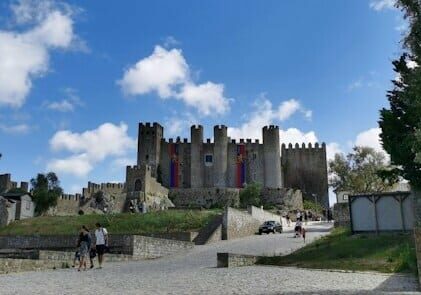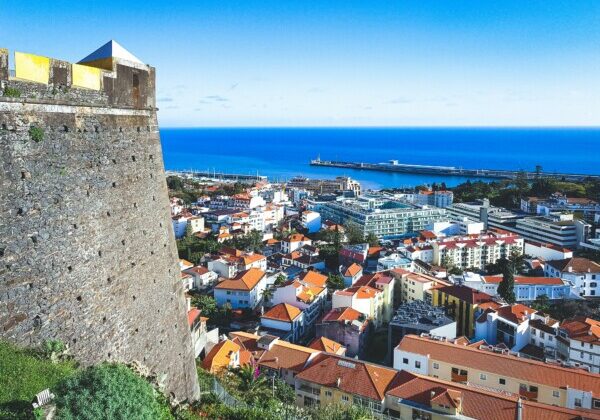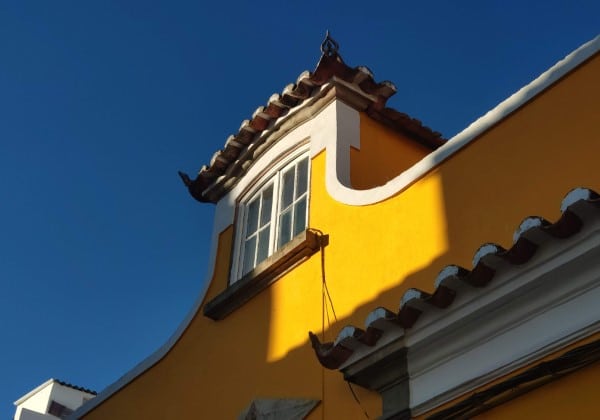Updated: April 23, 2024

The castles for sale in Portugal offer investors an opportunity to own a piece of the country’s rich history. Buying a palace for sale could be the right option if you are searching for a more adventurous investment alternative to a luxury villa or a modern city apartment. Consider the possibility of living in a countryside castle on the Madeira Islands with rolling landscapes dotted with olive groves or a luxury haven with sea views on the shores of Caldas da Rainha.
These luxury properties for investment can often be cheaper than first expected, especially if you find abandoned castles for sale in Portugal. However, this depends significantly on the residence’s type and size, as well as property features such as a garden, swimming pool, elaborate dining room, and historical art.
This article will provide practical information about searching for the perfect chateau for sale in Portugal. We will also provide a step-by-step guide to buying your dream luxury residence and insight into essential considerations about investment and ownership of historical sites.
An Overview of Luxury Historical Property in Portugal
Historical property such as manors, palaces, and estates are synonymous with Portuguese culture and history. Other luxury properties in Portugal, including the architectural style of luxury villas, estates, high-end apartments and houses, and even a quaint chalet on small town farms, offer prestige, comfort, and a unique Portuguese living experience.
The oldest castle in Portugal dates back to the eighth and ninth centuries – the Castle of the Moors (Castelo dos Mouros). This Moorish fortress lies in the middle of the forest in Sintra and stands atop a peak in the Sintra Hills. The castle offers a proud display of the rich depth of history in Portugal, as well as a magnificent view that extends from Sintra to the ocean. Sintra is also home to The Pena Palace (Palácio Nacional da Pena) and the Quinta da Regaleira.
Finding a castle for sale in Sintra, Portugal, may be challenging. Still, if you are interested in the area, it is best to speak with an experienced professional who can provide you with tailored advice on where to find castles for sale in the country. A professional like a buyer’s agent or real estate agent will also be able to advise you on investment and ownership laws on historical residences and give you the information you need to buy real estate as a foreigner in Portugal.

With the help of a professional, you will have access to castles for sale in South Portugal and other regions of the country, such as Alentejo, Douro, Algarve, and the Northern areas near Lisbon. If you are more interested in agricultural property located in the countryside, our Best Places to Find Farms for Sale in Portugal guide and buyer’s agent services can help you find the best farm at the price.
In the section below, we will look at the diverse cultures that have influenced and added unique character to architecture and properties in Portugal, from palaces on the Azores islands to castles on the Madeira Islands and the regions in between.
Islamic influence
The 8th Century saw the first castles built in the country (and perhaps even Europe) following the arrival of Berber and Arab Muslims to the Iberian Peninsula. These castles followed the designs of Roman forts found in Syria and the Levant and were known as Hsin.
More castles in this design were built over the following centuries, coinciding with the Cordoba Caliphate, until the Hsin gradually evolved to match traditional medieval designs. Surviving Hsin castles are still found in many areas of Portugal. Examples of such include Sintra, Alcoutim, and Aljezur.
During the 12th Century, the Almohads brought innovations to castle construction. Some of the best-preserved castles in the country are from this period, and these Moorish designs can still be seen in the Cerca Velha (old wall) of Lisbon and Évora, with the horseshoe gates. Some places in the country where you can find castles in this design are Faro, Silves, and Alandroal.
Early medieval castles
The area surrounding the Douro River was well-fortified during the ninth and tenth centuries. However, few of these structures remain because of their relatively basic constructions of wood and stone. Nonetheless, you can still see signs of this period in a few areas, such as in Gestaçô, Penha Longa, and Baião.
From the beginning of the 10th Century, medieval castles became more widespread in the north as feudal lords established control over the Moors. For example, they built more robust castles that can still be seen today in the motte-and-bailey design.
Gothic and Romanesque castles
The next few centuries saw a shift from early medieval castles to Gothic and Romanesque designs. As new attack methods arrived, castles were built with strength in mind, more complex designs, and larger. The rise of Romanesque castles ran alongside local and foreign military and religious orders such as the Knights Temple. Designs increasingly matched the constructions built in the holy land, which can be seen in Minho and Beira.
French influence can be seen in the castles from the 13th Century. This saw the arrival of Gothic architecture. Examples can be seen in the capital, Lisbon, at the famous Castelo de São Jorge (Castle of Sao Jorge) and in Óbidos. You can also see the Gothic design in the north, in Guimarães and Bragança.
Practical Information on Historic Castles for Sale in Portugal
In this part of our Castles for Sale in Portugal article, we’ll provide you with key information on the cost of castles, rules for investing in buildings with heritage, and other factors to consider.
How much do castles for sale in Portugal cost?
The cost of castles for sale in Portugal depends on their size and history. In 2024, palaces and castles are priced between €1,198,953 ($1,284,629) and €12,500,000 ($13,440,860).
On the more affordable spectrum, cheap castles for sale in Portugal are still a significant investment. It is, therefore, essential to determine the size and type of castle you would like to purchase and what you will use it for. This will help you find castles for sale in Portugal that fall within your budget and meet your needs. If you and your family are considering becoming Portuguese residents, there are several visa options to consider including the Portugal Golden Visa Program, the Portugal D7 Visa and the Portugal Digital Nomad Visa.
Rules for investing in buildings with heritage
There are specific rules for investing in buildings with heritage in Portugal. A key difference is that there are likely many more stakeholders involved in the process, as you are putting your money into the historic fabric of the country.
In Portugal, the DGPC (Direção Geral do Património Cultural or Directorate General for Cultural Heritage) is responsible for the protection of cultural heritage areas, and they list the historical properties in Portugal.
It is worth checking with them when purchasing a historic site to ensure that there are no specific rules for the historic property that you are interested in. There may also be restrictions regarding the property renovation projects you can make. This will ensure that you stay within their regulations for protecting historic sites.
Also, if you are buying or renovating historic properties, the Câmara (local chamber) may be able to help with the renovation process. They will need to approve any significant changes or upgrades to the property. It would help if you kept the property’s facade, and there are technical rules to comply with. Note that you may also be able to get subsidies.
Factors to consider with castles for sale in Portugal
In the table below we will explore the factors to consider before you decide to buy a castle for sale in Portugal.
Factors | Considerations |
Budget | How much are you willing to spend on your castle? |
Location | Which region of Portugal would you like your castle to be in? |
Castle Type | Are you looking for a modern or an old castle? |
Renovation and Maintenance | How much restoration work will the castle need? |
Additional Costs | What are the associated costs for maintenance? |
ROI | What is the possible return on investment possibilities if you are buying for an investment? Is the castle situated in a popular area for tourists? |
Legalities | What are the local rules for buying a castle? Your renovations may be restricted if not aligned with the castle's heritage. |
A Step-by-Step Guide for Foreign Buyers
When buying a castle in Portugal, the same process will need to be followed as with purchasing any other property here. It is highly recommended that you contact agencies specializing in unique properties, including castles and historical estates. These buyer’s agents or real estate agents will also have expertise in the local real estate market trends concerning castles and historic properties in Portugal.
This step-by-step guide will provide all the information you need to find castles for sale in Portugal and how to invest in or buy the property.
Step 1: Find a good lawyer
When you are looking to buy a castle, you must have an experienced Portugal real estate lawyer to help you navigate the process. It is worth scouting out a professional who has specific experience in dealing with historic properties. This is because the process may be more cumbersome as you invest in sites of historical importance to Portugal.
A good lawyer will be able to assist you with the legal aspects of buying a historic site, ensuring that you have all the documents that you need and practicalities and deadlines to be aware of in the process.
Step 2: Find the right property

Check with DGPC to ensure everything runs seamlessly when purchasing the castle and the rules you must follow in renovation projects. It is also probable that there are other stakeholders involved, so bear this in mind and ask relevant questions to determine what you can and cannot do with the property. Your lawyer will be able to help you with this.
You must also check with your council (Câmara) regarding restoring the historic property. With any significant changes and upgrades to the property, you will need to get their approval. Read our article on Portugal Property Finder: Simplify Your Home Search for some top tips.
Step 3: Do your due diligence
Visit the castle and make sure that everything is in order. This is a substantial investment, so hire a surveyor and triple-check everything to ensure everything is as it should be. Old properties often require considerable maintenance, so bear this in mind when doing your due diligence checks. Also, there will likely be additional maintenance costs with historical properties after the purchase.
Step 4: Taxes and additional costs
You must be aware of the taxes of buying property in Portugal. Your lawyer will be able to help with this. Before you make a purchase, you will need a NIF (Tax Number), and it is also a good idea to have a Portuguese bank account so there are no transfer costs. As with all property purchases in the country, the following taxes must be accounted for.
At the time of purchase:
- Imposto Municipal sobre Transmissões Onerosas de Imóveis (IMT) (Municipal Tax on Onerous Transmissions of Real Estate)
- Imposto de Selo (Stamp Tax)
Ongoing taxes:
- Imposto Municipal sobre Imóveis (IMI) (The Municipal Property Tax)
- Notary Fees
- Wealth Tax
- Maintenance costs
Step 5: Purchase the property
The exact process of purchasing any property will be in place. You must sign the Promissory Contract and Escritura (Final Title Deed) at the Notary and the final contract is then sent to the Land Registry, which will record you as the latest legal owner.
Goldcrest is a buyer’s agent that is based in Lisbon. We provide expert, impartial advice on real estate investments and how to buy property in Portugal. From scouting out the perfect property through to property acquisition, we have you covered throughout the process. If you are looking to purchase property in Portugal, don’t hesitate to get in touch. Our team of skilled experts is available to solve all your real estate doubts, helping you with the property search and offering insightful expertise and strategic advice.Goldcrest: How We Can Help You
Why choose Goldcrest?
Frequently Asked Questions About Castles for Sale in Portugal
Where can you find castles for sale in Portugal?
Portugal is home to many castles, from the south to the north. We recommend getting in touch with estate agents or buyer’s agents who can offer their expertise. Consult with your lawyer or a realtor who is an expert in this area to ensure you are eligible to buy.
How much does a castle in Portugal typically cost?
In 2024, a palace or castle in Portugal will be priced between € 1,198,953 ($1,284,629) and € 12,500,000 ($13,440,860). Prices will vary depending on the size, features, and location of the castle.
Are there specific rules for buying a castle in Portugal?
You should check with the Câmara (local chamber) regarding any renovations you want to make to the castle. Castles are part of the fabric of Portugal’s history. The Câmara, therefore, must be informed when making any significant changes or upgrades to the property.
Is a castle a good investment opportunity?
A castle is a significant investment for you. You should know about the possible avenues for returns on investment. For example, would it be a good option for vacations, hunting, hiking, weddings, etc.? Make sure you consider each before investing in a castle. You will, however, be able to find abandoned castles for sale in Portugal, and it could prove to be the investment of a lifetime.
Can foreigners buy castles in Portugal, and what are the specific conditions?
Yes, you can buy a castle in Portugal. The castle’s size, type, and cost will depend on whether it is an investment on which you would like returns or if it is an opportunity to live in a unique home. It is essential to consult with your lawyer or a realtor who is an expert in this area to determine whether you can buy a castle.
Is it worth buying a castle in Portugal?
This will depend on why you want to purchase a castle in Portugal. A castle can be an excellent investment with potential avenues for returns. For example, enabling the castle for vacations, hunting, hiking, weddings, or other tourist ventures would allow you to see a return on your investment. It is essential to consider all options before investing in a castle.

